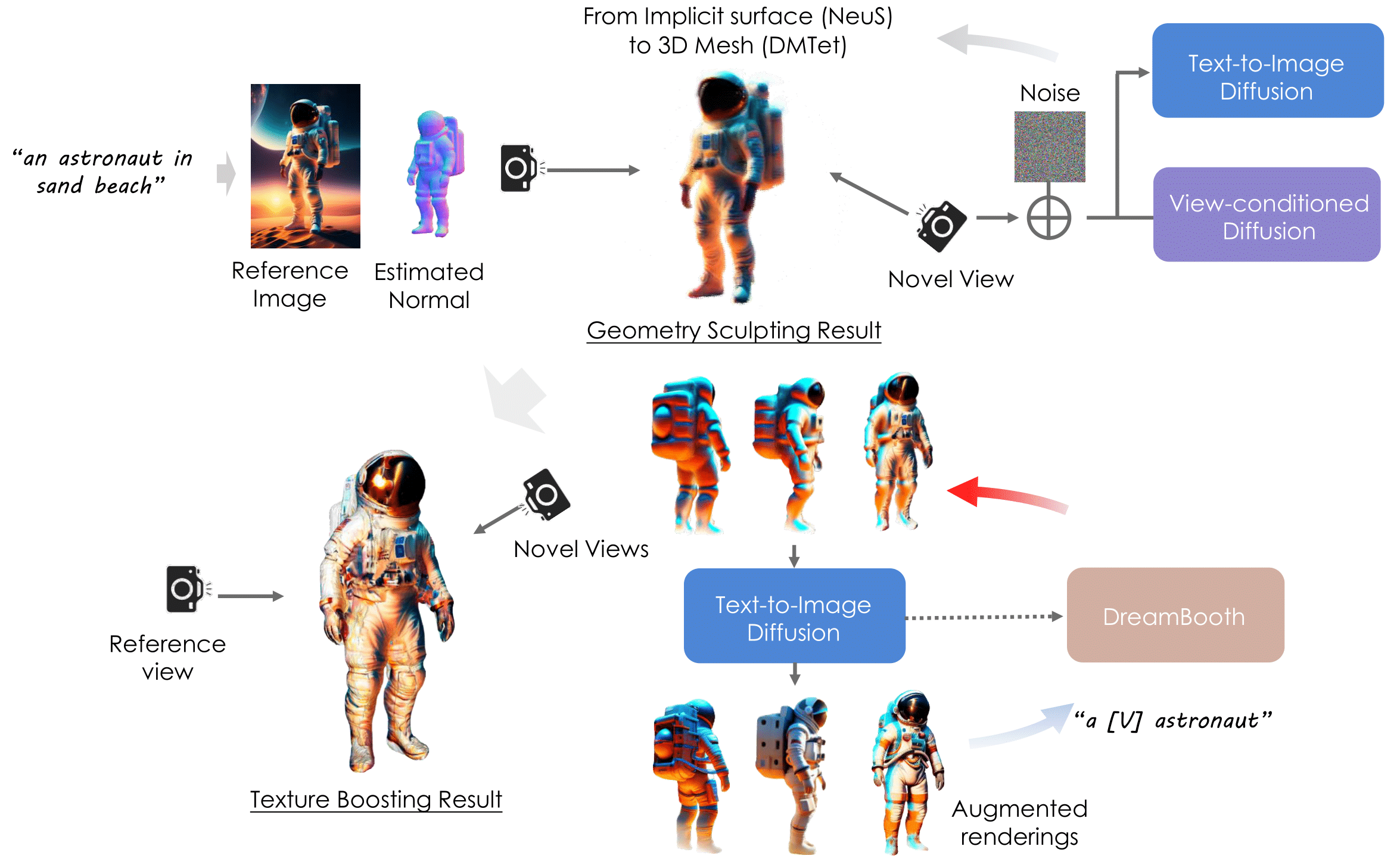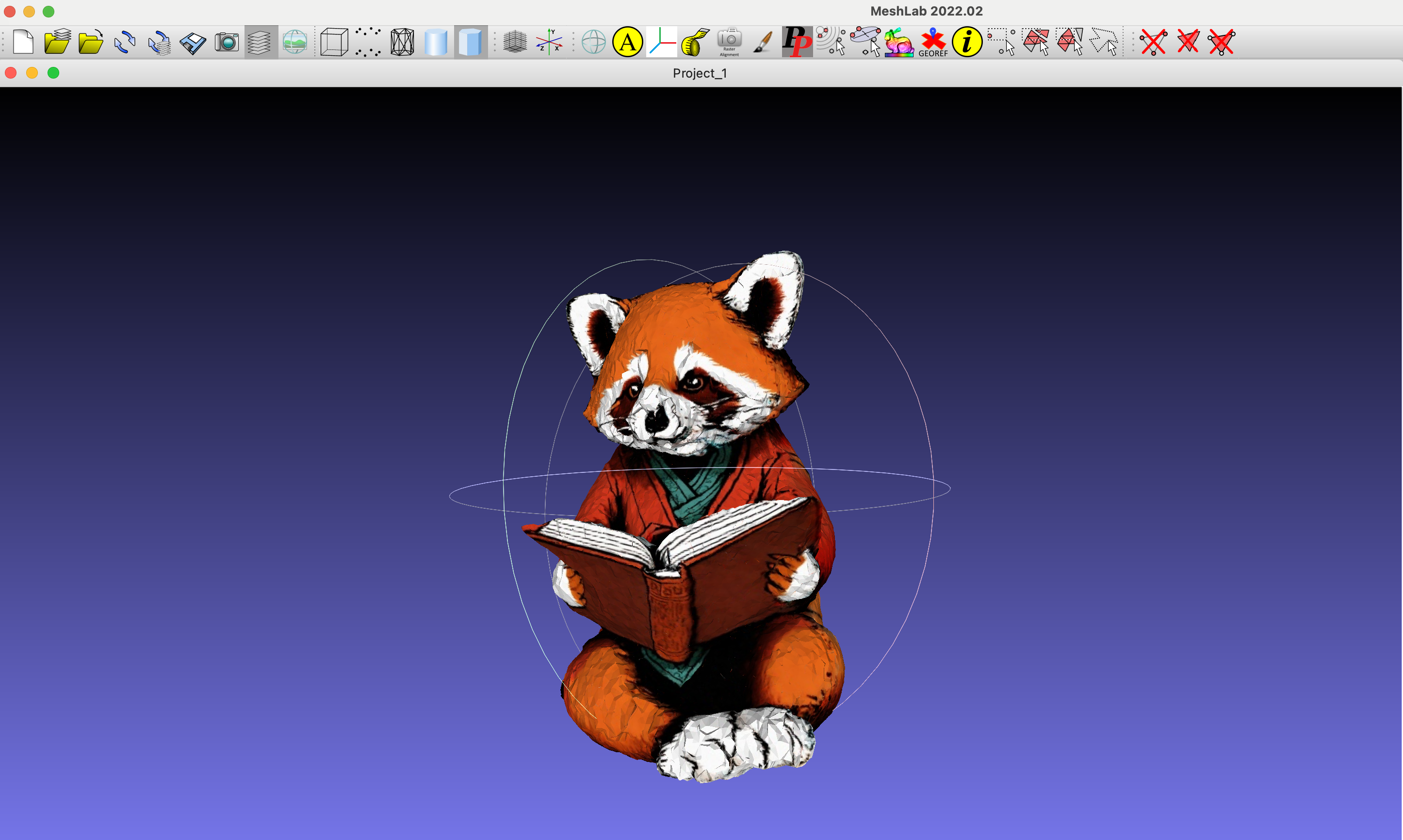DreamCraft3D
Paper | Project Page | Youtube video | Replicate demo
Official implementation of DreamCraft3D: Hierarchical 3D Generation with Bootstrapped Diffusion Prior
Jingxiang Sun, Bo Zhang, Ruizhi Shao, Lizhen Wang, Wen Liu, Zhenda Xie, Yebin Liu
Abstract: We present DreamCraft3D, a hierarchical 3D content generation method that produces high-fidelity and coherent 3D objects. We tackle the problem by leveraging a 2D reference image to guide the stages of geometry sculpting and texture boosting. A central focus of this work is to address the consistency issue that existing works encounter. To sculpt geometries that render coherently, we perform score distillation sampling via a view-dependent diffusion model. This 3D prior, alongside several training strategies, prioritizes the geometry consistency but compromises the texture fidelity. We further propose Bootstrapped Score Distillation to specifically boost the texture. We train a personalized diffusion model, Dreambooth, on the augmented renderings of the scene, imbuing it with 3D knowledge of the scene being optimized. The score distillation from this 3D-aware diffusion prior provides view-consistent guidance for the scene. Notably, through an alternating optimization of the diffusion prior and 3D scene representation, we achieve mutually reinforcing improvements: the optimized 3D scene aids in training the scene-specific diffusion model, which offers increasingly view-consistent guidance for 3D optimization. The optimization is thus bootstrapped and leads to substantial texture boosting. With tailored 3D priors throughout the hierarchical generation, DreamCraft3D generates coherent 3D objects with photorealistic renderings, advancing the state-of-the-art in 3D content generation.
News
- 2024.10: We release DreamCraft3D++, featuring significantly enhanced 3D generation quality and efficiency.
Method Overview
Installation
Install threestudio
This part is the same as original threestudio. Skip it if you already have installed the environment.
See installation.md for additional information, including installation via Docker.
- You must have an NVIDIA graphics card with at least 20GB VRAM and have CUDA installed.
- Install
Python >= 3.8. - (Optional, Recommended) Create a virtual environment:
python3 -m virtualenv venv
. venv/bin/activate
# Newer pip versions, e.g. pip-23.x, can be much faster than old versions, e.g. pip-20.x.
# For instance, it caches the wheels of git packages to avoid unnecessarily rebuilding them later.
python3 -m pip install --upgrade pip
- Install
PyTorch >= 1.12. We have tested ontorch1.12.1+cu113andtorch2.0.0+cu118, but other versions should also work fine.
# torch1.12.1+cu113
pip install torch==1.12.1+cu113 torchvision==0.13.1+cu113 --extra-index-url https://download.pytorch.org/whl/cu113
# or torch2.0.0+cu118
pip install torch torchvision --index-url https://download.pytorch.org/whl/cu118
- (Optional, Recommended) Install ninja to speed up the compilation of CUDA extensions:
pip install ninja
- Install dependencies:
pip install -r requirements.txt
Download pre-trained models
- Zero123. We use the newest
stable-zero123.ckptby default. You can download it here intoload/zero123/. In the paper we usezero123-xl.ckptand you can download it by
cd load/zero123
bash download.sh
- Omnidata. We use Omnidata for depth and normal predition in
preprocess_image.py(copyed from stable-dreamfusion).
cd load/omnidata
gdown '1Jrh-bRnJEjyMCS7f-WsaFlccfPjJPPHI&confirm=t' # omnidata_dpt_depth_v2.ckpt
gdown '1wNxVO4vVbDEMEpnAi_jwQObf2MFodcBR&confirm=t' # omnidata_dpt_normal_v2.ckpt
Quickstart
Preprocess the input image to move background and obtain its depth and normal image.
python preprocess_image.py /path/to/image.png --recenter
Our model is trained in multiple stages. You can run it by
prompt="a brightly colored mushroom growing on a log"
image_path="load/images/mushroom_log_rgba.png"
# --------- Stage 1 (NeRF & NeuS) --------- #
python launch.py --config configs/dreamcraft3d-coarse-nerf.yaml --train system.prompt_processor.prompt="$prompt" data.image_path="$image_path"
ckpt=outputs/dreamcraft3d-coarse-nerf/$prompt@LAST/ckpts/last.ckpt
python launch.py --config configs/dreamcraft3d-coarse-neus.yaml --train system.prompt_processor.prompt="$prompt" data.image_path="$image_path" system.weights="$ckpt"
# --------- Stage 2 (Geometry Refinement) --------- #
ckpt=outputs/dreamcraft3d-coarse-neus/$prompt@LAST/ckpts/last.ckpt
python launch.py --config configs/dreamcraft3d-geometry.yaml --train system.prompt_processor.prompt="$prompt" data.image_path="$image_path" system.geometry_convert_from="$ckpt"
# --------- Stage 3 (Texture Refinement) --------- #
ckpt=outputs/dreamcraft3d-geometry/$prompt@LAST/ckpts/last.ckpt
python launch.py --config configs/dreamcraft3d-texture.yaml --train system.prompt_processor.prompt="$prompt" data.image_path="$image_path" system.geometry_convert_from="$ckpt"
[Optional] If the "Janus problem" arises in Stage 1, consider training a custom Text2Image model.
First, generate multi-view images from a single reference image by Zero123++.
python threestudio/scripts/img_to_mv.py --image_path 'load/mushroom.png' --save_path '.cache/temp' --prompt 'a photo of mushroom' --superres
Train a personalized DeepFloyd model by DreamBooth Lora. Please check if the generated mv images above are reasonable.
export MODEL_NAME="DeepFloyd/IF-I-XL-v1.0"
export INSTANCE_DIR=".cache/temp"
export OUTPUT_DIR=".cache/if_dreambooth_mushroom"
accelerate launch threestudio/scripts/train_dreambooth_lora.py \
--pretrained_model_name_or_path=$MODEL_NAME \
--instance_data_dir=$INSTANCE_DIR \
--output_dir=$OUTPUT_DIR \
--instance_prompt="a sks mushroom" \
--resolution=64 \
--train_batch_size=4 \
--gradient_accumulation_steps=1 \
--learning_rate=5e-6 \
--scale_lr \
--max_train_steps=1200 \
--checkpointing_steps=600 \
--pre_compute_text_embeddings \
--tokenizer_max_length=77 \
--text_encoder_use_attention_mask
The personalized DeepFloyd model lora is save at .cache/if_dreambooth_mushroom. Now you can replace the guidance the training scripts by
# --------- Stage 1 (NeRF & NeuS) --------- #
python launch.py --config configs/dreamcraft3d-coarse-nerf.yaml --train system.prompt_processor.prompt="$prompt" data.image_path="$image_path" system.guidance.lora_weights_path=".cache/if_dreambooth_mushroom"
Tips
- Memory Usage. We run the default configs on 40G A100 GPUs. For reducing memory usage, you can reduce the rendering resolution of NeuS by
data.height=128 data.width=128 data.random_camera.height=128 data.random_camera.width=128. You can also reduce resolution for other stages in the same way.
Export Meshes
You can export the textured mesh obj using the following scipt:
# this uses default mesh-exporter configurations which exports obj+mtl
python launch.py --config path/to/trial/dir/configs/parsed.yaml --export --gpu 0 resume=path/to/trial/dir/ckpts/last.ckpt system.exporter_type=mesh-exporter
Todo
- Release the reorganized code.
- Realse the test image data.
- Clean the original dreambooth training code.
- Provide some running results and checkpoints.
Credits
This code is built on the amazing open-source projects threestudio-project and stable-dreamfusion.
Related links
BibTeX
@article{sun2023dreamcraft3d,
title={Dreamcraft3d: Hierarchical 3d generation with bootstrapped diffusion prior},
author={Sun, Jingxiang and Zhang, Bo and Shao, Ruizhi and Wang, Lizhen and Liu, Wen and Xie, Zhenda and Liu, Yebin},
journal={arXiv preprint arXiv:2310.16818},
year={2023}
}
@article{sun2024dreamcraft3d++,
title={DreamCraft3D++: Efficient Hierarchical 3D Generation with Multi-Plane Reconstruction Model},
author={Sun, Jingxiang and Peng, Cheng and Shao, Ruizhi and Guo, Yuan-Chen and Zhao, Xiaochen and Li, Yangguang and Cao, Yanpei and Zhang, Bo and Liu, Yebin},
journal={arXiv preprint arXiv:2410.12928},
year={2024}
}


